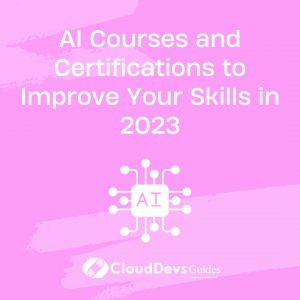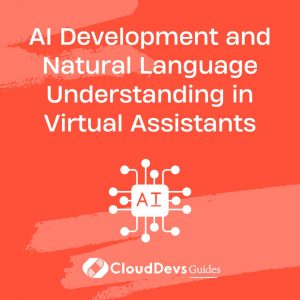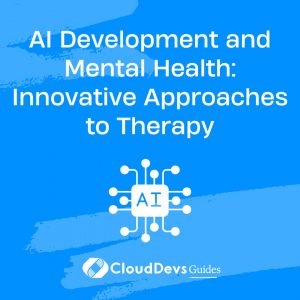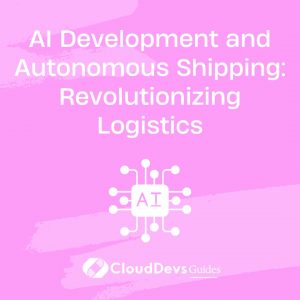Top AI courses to take online in 2025
Artificial Intelligence (AI) has firmly established itself as a leading technology, catering to a diverse range of applications and gaining widespread adoption across enterprises of different sizes. With its potent capabilities for developing intelligent systems, there is a growing demand for skilled AI developers.
For individuals interested in enhancing their proficiency in AI or pursuing a career in AI development, exploring certification programs or enrolling in relevant AI courses can offer substantial advantages. This article will delve into some of the top AI course options and certifications available in 2023.
Table of Contents
1. Supervised Machine Learning: Regression and Classification on Coursera
The Supervised Machine Learning: Regression and Classification course on Coursera is part of the Machine Learning Specialization. The course is designed to teach you the fundamentals of machine learning, including supervised and unsupervised learning, and deep learning. It also covers topics such as multiple linear regression, logistic regression, neural networks, decision trees, clustering, dimensionality reduction, recommender systems, and more. The course is taught by Andrew Ng and offered by DeepLearning.AI along with Standford University.
The course modules are;
- Introduction to Machine Learning: In this section, you will receive an overview of Machine Learning, exploring its fundamental principles, algorithms, and practical applications in various domains.
- Regression with Multiple Input Variables: This module covers the techniques and methods for regression analysis with multiple input variables in the context of Artificial Intelligence, providing insights into predictive modeling.
- Classification: In this section, you will delve into the world of classification in Artificial Intelligence, specifically focusing on utilizing logistic regression models to categorize data into different classes.
By the end of this course, you will receive a certificate e certificate from DeepLearning.AI and Standford University which you can share on Linkedin.
2. AWS Machine Learning Engineer NanoDegree Program on Udacity
The AWS Machine Learning Engineer Nanodegree program on Udacity is designed to support software developers and data scientists with the data science and machine learning skills they need to master to build and deploy machine learning models in production. This AI Nanodegree program focuses on the latest best practices and capabilities that are enabled by Amazon SageMaker.
The course modules are;
- Welcome to the Artificial Intelligence Certificate Course: In this section, you will be introduced to the Artificial Intelligence Certificate Course, setting the stage for an in-depth exploration of fundamental AI concepts and applications.
- Introduction to Machine Learning: In this section, you will explore the foundational principles of machine learning, gaining a comprehensive understanding of its significance and diverse applications within the broader field of artificial intelligence.
- Developing Your First ML Workflow: This section will engage you in hands-on experience as you develop your initial machine learning workflow, applying fundamental concepts to practical scenarios.
- Deep Learning Topics with Computer Vision and NLP: This section will dive into advanced topics in deep learning, specifically focusing on computer vision and natural language processing (NLP), unraveling the intricacies of these AI domains.
- Operationalizing Machine Learning on SageMaker: In this section, you will learn how to operationalize machine learning models on SageMaker, Amazon Web Services machine learning platform, gaining valuable skills in deploying and managing AI solutions.
- Capstone Build Your Own Machine Learning Portfolio: This section will engage in a capstone project where you will have the opportunity to apply your acquired knowledge and skills, building a machine learning portfolio that showcases your expertise.
- Conclusion: Conclude your Artificial Intelligence Certificate Course by reflecting on the key concepts covered, the skills acquired, and the practical applications of artificial intelligence across diverse domains.
You can follow an optional extra course which is based on career services.
3. AI Applications for Growth Executive Certification on Kellogg
The Kellogg Executive Education program on AI Applications for Growth is crafted to offer a hands-on exploration of how both established companies and startups are leveraging AI to disrupt industries and enhance their competitive positions. This initiative seeks to empower organizational leaders, innovators, and investors with the necessary expertise and capabilities to effectively utilize AI, fostering customer value creation and gaining a strategic edge.
The course modules are;
- The AI Revolution: Trends, Tools, and Applications: In this Artificial Intelligence certificate course, you will explore the evolution of AI, covering trends, tools, and real-world applications shaping the current landscape.
- AI and Customer Experience Management: You will learn the impact of AI on customer experience management, learning how advanced technologies enhance customer interactions and satisfaction.
- AI and Operations Management: This course module will teach you how AI is revolutionizing operations management, optimizing processes, and increasing efficiency in various industries.
- AI and Business Support Functions: This module topic explores the integration of AI in business support functions, understanding how automation and intelligent systems streamline administrative tasks.
- AI Applications in Select Industries: This section will dive deeper into industry-specific AI applications, gaining insights into how AI is transforming healthcare, finance, manufacturing, and other key sectors.
- AI Applications in Autonomous Vehicles and Transportation: Here, you will learn about the role of AI in autonomous vehicles and transportation, understanding the technological advancements driving innovation in this field.
- Transforming Your Business with AI: Strategy and Capabilities: You will understand the strategic implications of AI for businesses, exploring how to develop and implement effective AI strategies and capabilities.
- Transforming Your Business with AI: Organization and Society: This course module covers the organizational and societal impacts of AI, providing a holistic view of the transformative effects of artificial intelligence on businesses and society.
Upon successful completion of this course, you will receive a Kellogg Executive Education verified digital certificate.
4. AI in Finance Specialization by CFTE on Coursera
The AI in Finance Specialization, offered by CFTE, is crafted to offer a thorough grasp of the essential building blocks for becoming a vital part of the AI transformation within the finance industry. This program encompasses key subjects like machine learning, deep learning, and computer vision, shedding light on their profound impact across all facets of the banking and financial sectors.
The course modules are;
- Neural Networks and Deep Learning: In this section of the Artificial Intelligence certificate course, you will delve into the fundamentals of neural networks and explore the principles of deep learning, laying a solid foundation for advanced AI applications.
- Improving Deep Neural Networks: Hyperparameter Tuning, Regularization, and Optimization: This module will teach you essential techniques for enhancing deep neural networks, covering hyperparameter tuning, regularization methods, and optimization strategies to optimize model performance.
- Structuring Machine Learning Projects: In this course segment, you will learn how to effectively structure machine learning projects, covering key concepts such as project design, workflow optimization, and best practices for successful implementation.
- Convolutional Neural Networks: You will explore the power of Convolutional Neural Networks (CNNs) in this section, understanding their applications in image recognition, computer vision, and other domains, and gaining hands-on experience in building and deploying CNNs.
- Sequence Models: This part of the AI certificate course will introduce you to sequence models, providing insights into their applications in natural language processing, speech recognition, and other sequential data tasks, and guiding you through the development of effective sequence models.
This course carries college credit which is accepted at US colleges and universities.
5. CS50’s Introduction to Artificial Intelligence with Python on Edx
The CS50’s Introduction to Artificial Intelligence with Python course on edX is designed to provide an introduction to the concepts and algorithms at the foundation of modern artificial intelligence, diving into the ideas that give rise to technologies like game-playing engines, handwriting recognition, and machine translation. The course is taught by David J. Malan and Brian Yu from Harvard University.
The course modules are;
- Graph Search Algorithms: In this Artificial Intelligence certificate course, you will delve into graph search algorithms, understanding their applications and optimization techniques for problem-solving.
- Adversarial Search: Explore adversarial search strategies, learning how AI systems make decisions in competitive environments and develop optimal game-playing strategies.
- Knowledge Representation: This course module will teach you the principles of knowledge representation in AI, understanding how to model and organize information for intelligent systems.
- Logical Inference: You will learn the fundamentals of logical inference in AI, understanding how to derive new information from existing knowledge using logical reasoning.
- Probability Theory: This section covers the application of probability theory in AI, exploring how uncertainty and randomness are modeled to make informed decisions.
- Bayesian Networks: In this section, you will delve into Bayesian networks, understand their structure, and learn how to model probabilistic relationships among variables for efficient decision-making.
- Markov Models: You will learn about Markov models in this AI course, understanding their applications in modeling dynamic systems and predicting future states based on current conditions.
- Constraint Satisfaction: In this section, you will explore constraint satisfaction problems and their solutions, understanding how to model and solve problems with constraints in AI applications.
- Machine Learning: This course module introduces machine learning, covering algorithms and techniques that enable systems to learn and improve their performance over time.
- Reinforcement Learning: You will learn about reinforcement learning, understanding how AI agents make decisions by interacting with an environment and receiving feedback.
- Neural Networks: This section delves into neural networks, understanding the architecture and training mechanisms of artificial neural networks used in machine learning and pattern recognition.
- Natural Language Processing: You will explore natural language processing in AI, understanding how machines comprehend and generate human language, with applications in text analysis and language translation.
Completing this Artificial Intelligence certificate course will equip you with a comprehensive understanding of these key concepts, preparing you for advanced applications in the field.
Here, we have added a comparison table for all the AI courses mentioned in this article.
| Course/ program | Cost | Level | Duration | Study mode |
|---|---|---|---|---|
| Supervised Machine Learning: Regression and Classification | Free | Beginner | 15 hours | Online |
| AWS Machine Learning Engineer Nanodegree | $249 | Intermediate / Advanced | 5 hours | Online |
| AI Applications for Growth | $2536 | Beginner / Intermediate / Advanced | 2 hours | Online |
| Deep Learning Specialization | Free | Intermediate | 3 months (10 hours a week) | Online |
| CS50’s Introduction to Artificial Intelligence with Python | Free | Beginner | 7 weeks | Online |
The provided table highlights variations in Artificial Intelligence courses, including differences in duration, costs, and prerequisite skills. Course fees are influenced by factors such as the learning platform, study format, and duration. When choosing an Artificial Intelligence course, it’s crucial to evaluate your skills, financial considerations, and career goals. This approach aids in identifying the most fitting AI course tailored to your specific requirements.
Conclusion
In conclusion, enrolling in an Artificial Intelligence course in 2023 offers a valuable opportunity for career growth. With effective training, you can hone your skills as an AI professional and engage in challenging projects. Whether you are an entry-level learner or an experienced practitioner, a plethora of courses and certification programs are available to elevate your proficiency in Artificial Intelligence development.
Table of Contents








